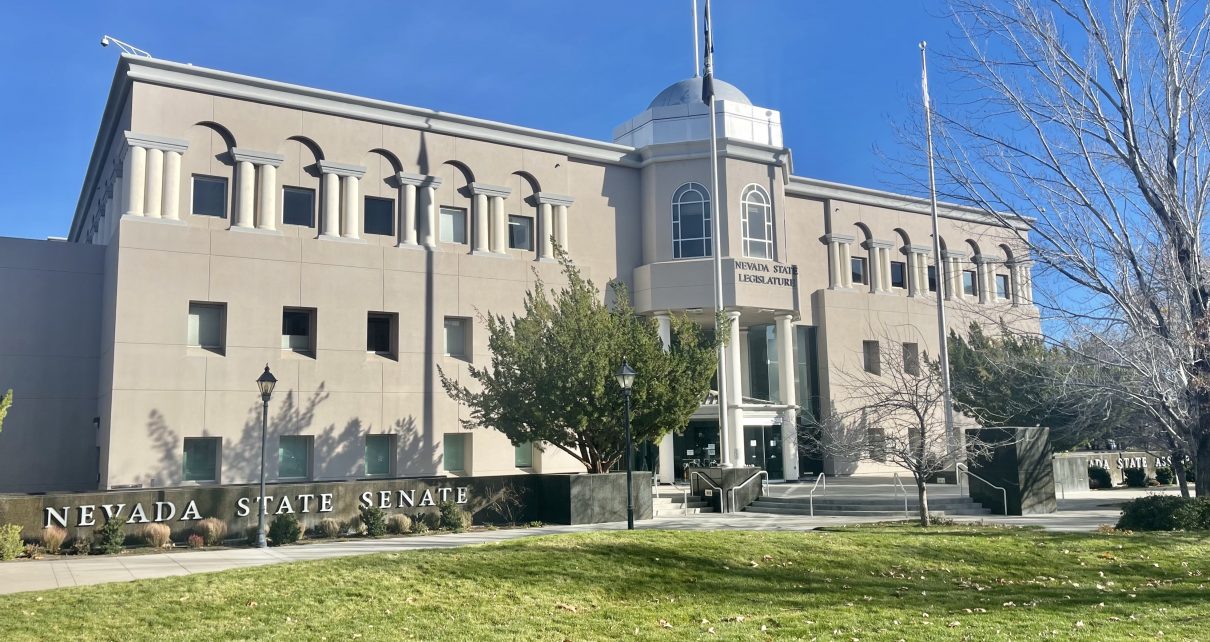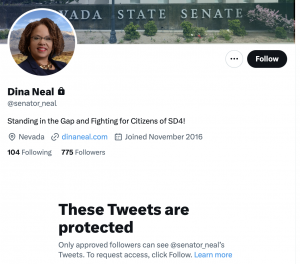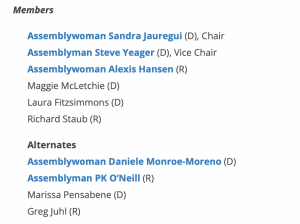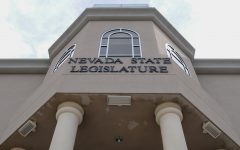
Nevada State Legislature, Carson City. (Photo: The Nevada Globe Editor for The Nevada Globe)
The Silver State Is A Sad State In Terms Of Ethics Investigations And Legislative Oversight
As numerous ethical scandals plague Nevada Democrats, the role of the Legislative Counsel Bureau and lack of a Senate Ethics Committee raises concerns
By Megan Barth, October 3, 2023 4:01 pm
Back in 2007, a complaint was filed against state Senator Warren Hardy (R-Las Vegas) with the Ethics Commission that he violated the law by failing to disclose an alleged conflict of interest and failing to abstain from voting on the bill in the 2007 Legislature. In 2009, the Nevada Supreme Court ruled that the state Ethics Commission had no authority to process an ethics complaint against Sen. Warren Hardy because of the separations of power.
In their unanimous decision the court said the power to discipline a legislator “is a function constitutionally committed to the Legislature, and it cannot be delegated to another branch of government.” With this ruling, and with the numerous ethical scandals plaguing the Democratic majority, one would expect to find a robust and defined Legislative Ethics Committee in Carson City, but one would be wrong.
In fact, the Legislative Counsel Bureau (LCB), an unelected group of lawyers, researchers, and financial experts, is the de facto judge and jury in relation to ethics complaints and related investigations. The LCB works with legislators, legislative committees and a Legislative Commission which “consists of 12 legislators who exercise general policymaking and supervising authority over the operations of the LCB. At every regular session of the Legislature, the Senate and the Assembly each designate six members and their alternates to serve on the Commission.”
With a Democratic majority in Carson City, the Legislative Commission is not only politically lopsided but seemingly absent in exercising their constitutional duty in determining discipline related to ethical violations of clearly defined ethics statutes. As the Legislative Commission has supervising authority over the LCB, questions could also be raised as to their influence in the LCB’s primary role in handling ethics complaints and the lack of ethics investigations and subsequent determinations.
The Globe has extensively chronicled the ethics scandals that have plagued Democratic lawmakers in the Silver State.
Democratic Assemblywoman Michelle Gorelow (AD-35) recently announced that she will not be seeking re-election in her swing district after she was exposed by the Las Vegas Review-Journal for voting in favor of the pork legislation that directed $250,000 to Arc of Nevada. A month after her vote, Gorelow became the nonprofit’s director and is only one of two employees at the organization.
Adding to the grift is Gorelow’s Democratic colleague Tracy Brown-May (AD-42) who serves on the board of Arc and voted to approve the appropriation without disclosing her association with the organization. To date, Brown-May is absent in that she has not commented or publicly acknowledged the scandal and has recently deleted her Twitter account.
Also exposed by the Review-Journal is Democratic Assemblyman C.H. Miller (AD-7) who failed to disclose that he was hired as the President and CEO of the Urban Chamber of Commerce before he voted to appropriate $100,000 on Chamber’s behalf.
In May, the Review-Journal reported that Democratic Senator Dina Neal (SD-4) was under investigation after a College of Southern Nevada professor claimed she had pressured him to direct federal money toward businesses that didn’t meet grant requirements, including one owned by her friend. Later that month, the Review-Journal reported that North Las Vegas city officials met with law enforcement regarding concerns Neal had used campaign funds to pay a $20,000 lien on her home.
Last month, the Review-Journal reported that Neal had created a legal defense fund, presumably in anticipation of the need to raise money for a legal defense. Neal has since made her Twitter account private.

David Colborne of the Nevada Independent did a little digging and found that Assemblywoman Venicia Considine (AD-18) is another Democratic legislator who voted in favor of bills that directed over $4,250,000 to the Legal Aid Center of Southern Nevada where she works as the director of Development and Community Relations.
According to the Assembly’s Ethics and Disclosure page:
The Assembly Select Committee on Ethics was created pursuant to Rule No. 23 of the Assembly Standing Rules. The Committee hears complaints concerning members of the Assembly on specific questions of alleged breaches of ethics and conflicts of interests. In addition, the Committee may hear requests brought by members of the Assembly for advice on specific questions of potential breaches of ethics and conflicts of interest.
A complaint which alleges a breach of ethics or a conflict of interest must be made in writing on a form provided by the Legislative Counsel, signed and verified under penalty of perjury by the person making the allegation, and filed with the Legislative Counsel. Legislative Counsel will review the complaint and any other relevant information and consult with the Chair of the Committee or, if the Chair is the subject of the complaint, with the Vice Chair to evaluate whether the Committee has jurisdiction and whether an investigation is warranted in the matter.

Speaking to a current Nevada Assembly member, the Globe was informed that the Assembly, as a whole, did not receive ethics training and only convened a select committee after a complaint was filed this last legislative session. As a member of the minority, the lawmaker was not allowed to view the complaint or made aware of which Assembly member was the subject of the complaint.
Although the Assembly, led by Speaker Steve Yeager, hastily convened a Select Committee on Ethics, no such committee seemingly exists in the Senate.
Speaking to a former Nevada lawmaker, the lawmaker explained that the Senate Ethics Committee was a combined committee. “If there was a question raised of misconduct, the Senate Leader and Speaker dealt with complaints internally. We didn’t have a specific or select committee and we haven’t seen them do shit. No member of the minority party was allowed to get any information related to ethics complaints.”
Which begs the question. How is the state Senate supposed to investigate or discipline a lawmaker if there is not a clearly-defined Senate Select Committee on Ethics?
After numerous unreturned phone calls and emails to the Legislative Counsel Bureau and a variety of Democratic and Republican lawmakers, the Globe was unable to confirm if a Senate Select Committee on Ethics exists. With the 2007 Nevada Supreme Court’s unanimous decision, coupled with the barrage of ethical scandals, legislative oversight and authority is needed if ethics, and not political power or self-enrichment, guide the decisions of the legislative branch.
- Illegal Alien Identified As Wrong-Way Driver in Fatal Crash That Killed LVMPD Officer - December 23, 2024
- Senator Rosen Joins Letter Raising Concerns About Pete Hegseth’s Nomination - December 20, 2024
- NV SOS Launches Four Investigations Into 2024 Election Violations - December 20, 2024





This right here: “Which begs the question. How is the state Senate supposed to investigate or discipline a lawmaker if there is not a clearly-defined Senate Select Committee on Ethics?” – Nevada Globe
Keep bringing sunlight. Hope more people take the visors off and get their head out of the sand. Pay attention to local and regional elections before more of a hot mess is made and have the audacity to complain.